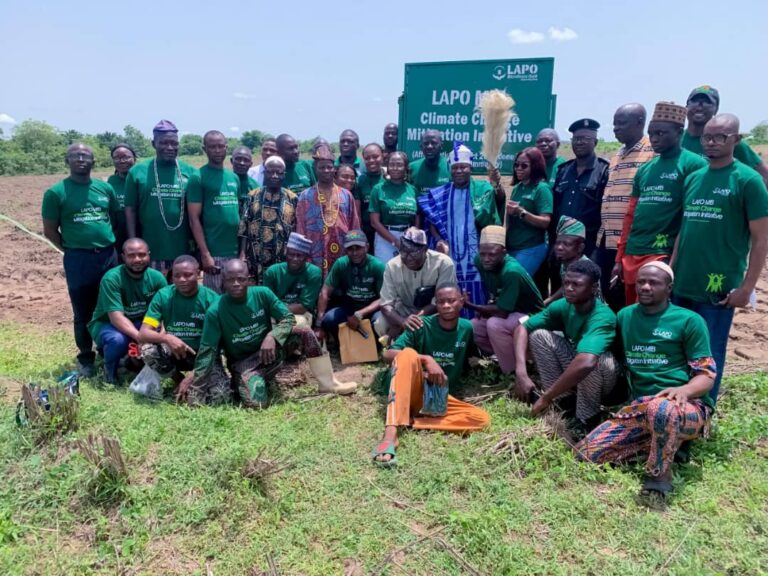In the heart of Ado Awaye, a serene community in Oyo State known for its iconic suspended lake, a quiet but powerful transformation is underway. Spearheaded by LAPO Microfinance Bank (LAPO MfB) in collaboration with the International Institute of Tropical Agriculture (IITA), an ambitious afforestation campaign is breathing new life into the landscape. This initiative is more than a response to environmental degradation—it is a deliberate and strategic step toward climate resilience and ecological restoration.
Climate change remains one of the most pressing challenges of our era, with widespread impacts that cut across continents. According to the United Nations, global temperatures have increased by about 1.1°C since the pre-industrial era, with Africa experiencing warming at an even faster rate. The World Health Organization warns that climate change could result in an estimated 250,000 additional deaths annually between 2030 and 2050 due to malnutrition, malaria, and heat stress. Despite contributing the least to global emissions, Africa remains among the most vulnerable to its effects.
Afforestation—the deliberate planting of trees in non-forested areas—has emerged as one of the most effective natural solutions to combating climate change. It not only absorbs carbon dioxide but also supports biodiversity, combats desertification, and improves the quality of life for surrounding communities. The 2024 Memorandum of Understanding between LAPO MfB and IITA to plant 3,000 trees across select communities in Ogun and Oyo States is a clear demonstration of long-term thinking and commitment to sustainable development.
Ado Awaye was strategically selected as a pilot site due to its ecological significance and potential for high impact. Although blessed with tourism potential and fertile land for agriculture, the community has suffered from years of deforestation and environmental neglect. As part of the initiative, over 1,200 trees—featuring indigenous species such as Akoko (Boundary Tree), Obi Edun (Monkey Cola), Agbalumo (African Star Apple), Iyeye(Hog Plum), Oro (Bush Mango), Kola Gigantia, Ito(African red-flowering tree), Igi Iya (African Mahogany), and Ayin (Axlewood Tree)—are being planted. These efforts not only restore ecological balance but also inspire environmental consciousness among residents. Notably, the area now houses the newly christened “King’s Forest,” as named by His Royal Majesty, Oba Ademola Olugbile Folakanmi.
As part of stakeholder engagement efforts, LAPO MfB officials paid a courtesy visit to the Alado of Ado Awaye, His Royal Majesty Oba Ademola Olugbile Folakanmi (Makuledoye II, Asoludero I), who lauded the initiative. “This project by LAPO Microfinance Bank is timely and noble,” he stated. “Our environment has suffered years of deforestation. These trees are not just plants—they represent life, protection, and prosperity. On behalf of the people of Ado Awaye, we express our deep gratitude and commitment to nurturing them.”
LAPO MfB’s Managing Director, Cynthia Ikponmwosa, reiterated the bank’s commitment to sustainability and holistic development:
“LAPO is not just a financial institution; we are development partners committed to improving the quality of life in our host communities. This tree-planting campaign is part of our response to the environmental crisis. Through this initiative, we aim to create a greener, healthier, and more resilient future for our children and generations yet unborn.”
She further noted:
“Thank you for embracing this afforestation project. It is part of our ESG commitment to environmental sustainability. This effort marks the beginning of our 3,000-tree target across Oyo and Ogun States. In the years to come, this project will play a crucial role in countering deforestation and restoring our ecosystem.”
Representing IITA, Mr. Olasupo Olukunle, Field Supervisor at the IITA Forest Centre, emphasized the importance of the initiative:
“We must plant trees to preserve our biodiversity. I appreciate Kabiyesi, the Alado of Ado Awaye, for supporting this laudable project, especially given the growing global concern around climate change.”
The project also incorporates educational outreach, with eco-clubs launched in local schools and awareness materials distributed to promote climate literacy and environmental stewardship. IITA provides ongoing technical support and monitoring to ensure the trees thrive and fulfill their carbon sequestration potential.
This initiative aligns with Nigeria’s obligations under the Paris Agreement and supports the achievement of several Sustainable Development Goals (SDGs), including SDG 13 (Climate Action), SDG 15 (Life on Land), and SDG 17 (Partnerships for the Goals). It also sets a benchmark for how corporate organizations can take meaningful local action to address global environmental challenges.
As rural communities like Ado Awaye grapple with increasingly frequent and intense climate impacts, projects like this serve as models for collaborative, community-driven climate solutions. LAPO MfB’s commitment demonstrates how financial institutions can broaden their developmental footprint to include environmental transformation, laying the foundation for a truly sustainable future.
In the rustling of new leaves and the rejuvenation of barren lands, the people of Ado Awaye are witnessing the start of a greener legacy—one rooted in shared purpose, resilience, and hope for the generations to come.

